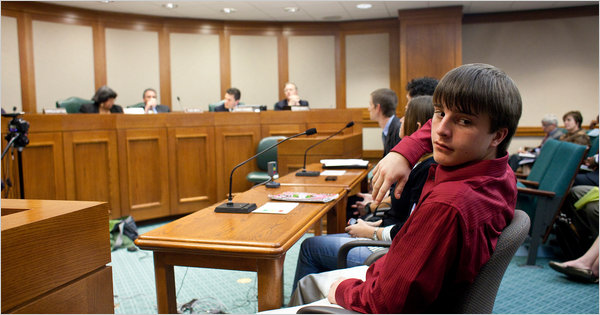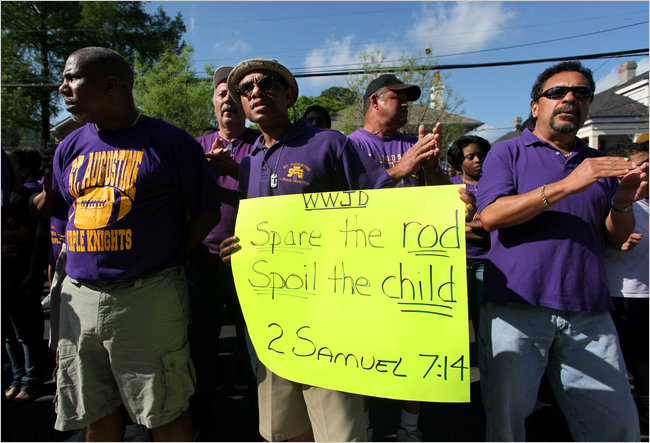When Tyler Anastopoulos got in trouble for skipping detention at his high school recently, he received the same punishment that students in parts of rural Texas have been getting for generations.
Tyler, an 11th grader from Wichita Falls, was sent to the assistant principal and given three swift swats to the backside with a paddle, recalled Angie Herring, his mother. The blows were so severe that they caused deep bruises, and Tyler wound up in the hospital, Ms. Herring said.
While the image of the high school principal patrolling the halls with paddle in hand is largely of the past, corporal punishment is still alive in 20 states, according to the Center for Effective Discipline, which tracks its use in schools around the country and encourages its end. Most of those states are in the South, where paddling remains ingrained in the social and family fabric of some communities.
Each year, prodded by child safety advocates, state legislatures debate whether corporal punishment amounts to an archaic form of child abuse or an effective means of discipline.
This month, Tyler, who attends City View Junior/Senior High School, told his story to lawmakers in Texas, which is considering a ban on corporal punishment. The same week, legislators in New Mexico voted to end the practice there.
Texas schools, Ms. Herring fumed, appear to have free rein in disciplining a student, “as long as you don’t kill him.”
“If I did that to my son,” she said, “I’d go to jail.”
Steve Harris, the superintendent of the City View Independent School District in Wichita Falls, declined to comment in detail on the case but said his investigation of the school had found no wrongdoing. Corporal punishment, Mr. Harris pointed out, has long been “one of the tools in the toolbox we use for discipline.”
Up until about 25 years ago, corporal punishment in public schools could be found in all but a handful of states, said Nadine Block, the founder of the Center for Effective Discipline. Prompted by the threat of lawsuits and research that questioned its effectiveness, states gradually started banning the practice.
According to estimates by the federal Department of Education, 223,190 children were subjected to corporal punishment in the 2005-6 school year. That was a nearly 20 percent drop from a few years earlier, Ms. Block said.
In Texas, at least 27 of about 1,000 school districts still use corporal punishment, said Jimmy Dunne, the founder and president of another group that is against the practice, People Opposed to Paddling Students.
That is enough to prompt advocates like Mr. Dunne to push to end the practice there. One bill being considered by the Legislature would permit corporal punishment only if parents specifically consent to it for their children. Another would ban it in schools altogether.
“Hitting children in our schools with boards is child abuse, and it promotes child abuse at home,” said Mr. Dunne, a former math teacher in Houston. “Parents see it’s legal in schools and think it’s O.K. to do at home.”
In New Mexico — where more than a third of the school districts permit corporal punishment, according to a local children’s legal services group — legislators approved a paddling ban this month. Gov. Susana Martinez, a Republican, has not indicated whether she will sign the bill.
Opponents of the measure, like State Senator Vernon D. Asbill, worried that a ban would tie teachers’ hands and make it harder for them to control students. “With parental supervision and parental approval, I believe it’s appropriate,” said Mr. Asbill, a Republican and a longtime teacher and school administrator from Carlsbad. “The threat of it keeps many of our kids in line so they can learn.”
But State Senator Cynthia Nava, a Democrat and a school superintendent from Las Cruces who supports the ban, said schools were no place for violence of any sort. “It’s shocking to me that people got up on the floor and argued passionately to preserve it,” she said of corporal punishment. “We should be educating kids that they can’t solve problems with violence.”
Calls to end corporal punishment have gotten louder of late, even in states unlikely to pass a ban. In Mississippi, the family of a teenager who was paddled in school has filed a federal lawsuit. The suit, filed against the Tate County School District, claims that corporal punishment is unconstitutional because it is applied disproportionately to boys.
The teenager’s lawyer, Joe Murray, is also representing the family of another student who was paddled at the same high school this month. In that case, the boy was struck so hard that he passed out and broke his jaw, Mr. Murray said.
An administrator who oversees the school district, James Malone, would not comment but said boys typically got in more trouble than girls.
In Louisiana, where corporal punishment is also legal, controversy erupted this year after the board of trustees for St. Augustine High School, the lone Catholic school in New Orleans and perhaps the country that still paddled its students, decided to ban the practice. St. Augustine was under pressure from Archbishop Gregory Aymond of New Orleans, who has said that paddling promotes violence.
Faculty and students from St. Augustine High School in New Orleans demanded that Archbishop Gregory Aymond reverse his ban on corporal punishment.
But the school’s administration and alumni want the practice reinstated. They argue that paddling for minor offenses has been instrumental in helping St. Augustine build character and achieve high graduation rates.
The school’s students have also voiced their support, holding a march in New Orleans to demand that the archbishop reverse his position.
Jacob Washington, a senior and the student body president, helped organize the march.
“This is a tradition for the school,” he said. “It’s how the school has been run for 60 years. Just the seniors alone — we can tell the difference between our class and some of the newer students who didn’t receive the same discipline.”

Photo: Ben Sklar for The New York Times
Tyler Anastopoulos, a student at City View Junior/Senior High School in Wichita Falls, Tex., told his story to state legislators, who are considering a ban on corporal punishment.

Photo: Jennifer Zdon for The New York Times
